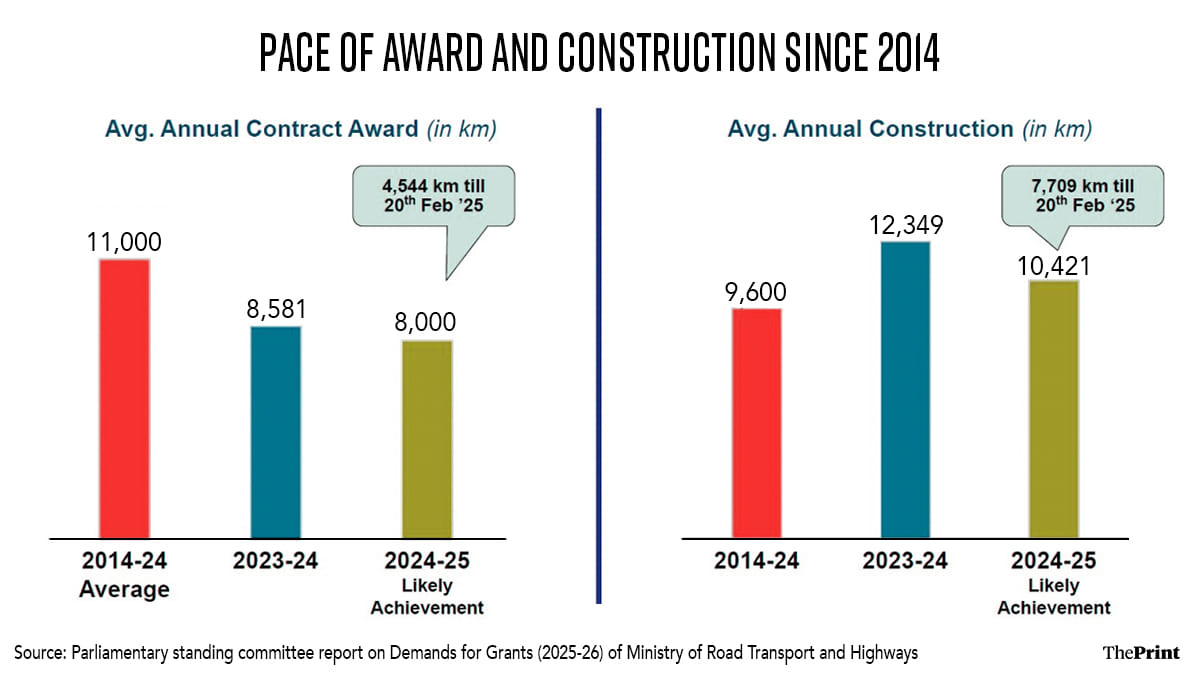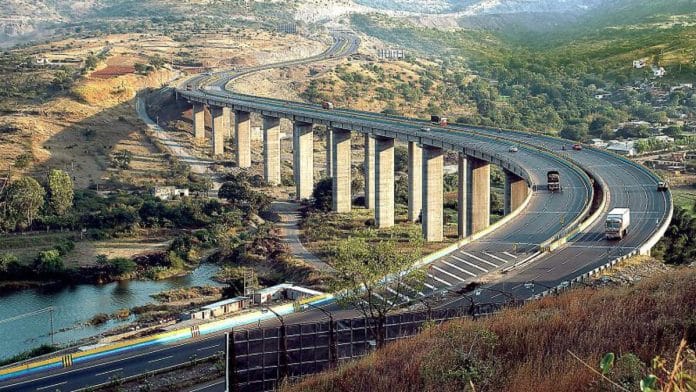New Delhi: A total of 697 highway projects in the country were delayed as of July 2024, with Maharashtra accounting for the highest number of these projects, followed by Karnataka with 40 and Haryana with 21 projects, the Ministry of Road Transport and Highways (MoRTH) informed a parliamentary panel Tuesday.
The ministry said that 35 percent of all project delays resulted from protracted land acquisition disputes, often exacerbated by inaccuracies in land records, resistance from local stakeholders, and prolonged compensation negotiations.
“Furthermore, 30 percent of stalled projects were linked to delays in obtaining railway clearances, particularly for road overbridges (ROBs) and underpasses,” the ministry informed the standing committee on transport, tourism and culture.
Headed by Janata Dal (United) MP Sanjay Kumar Jha, the parliamentary panel tabled its report on Demands for Grants (2025-26) of MoRTH in the Rajya Sabha.
“The primary causes of delay were identified as land acquisition bottlenecks, railway clearance delays, financial constraints faced by contractors, and regulatory approvals,” the report said.
An average of 11,000 km in highway projects was awarded each year between 2014 and 2024, the data showed. And, while 8,581 km of road projects were awarded in 2023-24, at least 4,544 km have been awarded till 20 February this year.
This is likely to go up to 8,000 km by 31 March, 2025, according to the report.
The average annual construction between 2014 and 2024 was 9,600 km. Of these, 12,349 km were constructed in 2023-24, while 7,709 km were constructed till 20 February 2025.
The construction is likely to go up to 10,421 km by 31 March, 2025, the report added.

In its report, the House panel observed that “awarding contracts before securing necessary approvals often results in avoidable cost escalations and delays”.
The committee has recommended that project approvals be finalised before contracts are awarded so as to ensure that projects are awarded only after all statutory, financial, and land acquisition approvals have been secured.
Financial distress of several contractors
Deposing before the parliamentary panel, the highways ministry acknowledged the financial distress of several contractors.
Attributing the stagnation to rising input costs, delayed government payments, and limited access to credit, the ministry assured the parliamentary panel that new financial support mechanisms were being explored to ensure the timely disbursement of payments.
“It was further noted that several projects had encountered delays due to protracted environmental and regulatory approvals, particularly those passing through forested or ecologically sensitive zones,” the report said.
The ministry informed the panel about the policy revision it is undertaking to ensure that no project shall be awarded unless at least 90 percent of the required land acquisition has been completed and all necessary statutory clearances have been secured.
“Additionally, it detailed plans to introduce financial incentives and penalties for contractors to uphold project timelines, along with the implementation of a dedicated monitoring framework to oversee progress on critical infrastructure projects,” the report said.
The parliamentary panel said that it was “deeply dissatisfied” with the ministry’s failure to “ensure rigorous financial screening before awarding contracts, leading to instances where contractors have defaulted on obligations due to financial distress, resulting in prolonged stagnation of infrastructure projects.”
It also noted that many contractors who were awarded projects lacked the financial capacity to sustain operations, necessitating greater due diligence in the contractor selection process.
“It is also observed that cost overruns and delayed government payments had further exacerbated the financial strain on executing agencies, raising concerns regarding the long-term sustainability of the ministry’s project implementation strategy,” the report said.
The panel urged the ministry to enforce more rigorous financial screening before awarding contracts, ensuring that only firms with proven financial capacity undertake major infrastructure projects.
(Edited by Sanya Mathur)
Also Read: Study ecological damage to Yamuna, identify polluter industries, parliamentary panel tells Centre






